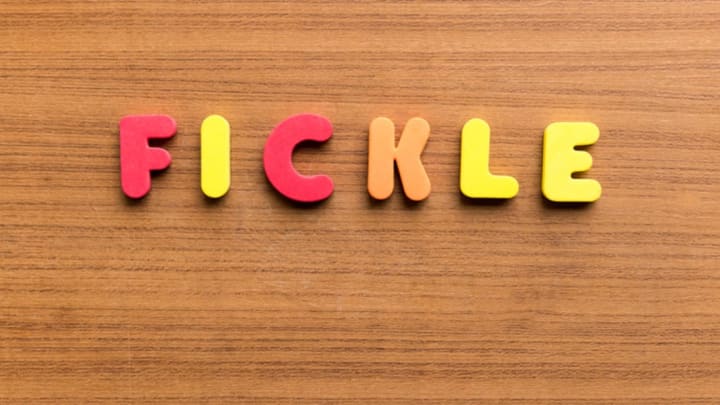Whether we’re waffling between Facebook and Twitter, beer and wine, or pure goodness and diabolical evil, few of us are steadfast enough to avoid some flip-flopping—and inconstancy must be an ancient quality, because there are many old-fashioned words for the flighty. Make sure to use them the next time you dither.
1. SHITTLE
Shittle, which goes back to the 1400s, means, according to the Oxford English Dictionary, “Inconstant, variable, wavering; fickle, flighty; hasty, rash.” In 1676, Aylett Sammes’ Britannia Antiqua Illustrata, Or the Antiquities of Ancient Britain demonstrated the changeability inherent in the term, describing a leader who “had once an intention to Invade Britain, but by his shittle Head, sudden repentance, and mighty designs against Germany, all came to nothing.” If you’re about as reliable as a ditzy dunderhead, you can also be called shittle-brained, shittle-headed, or the pleasingly rhyming shittle-witted.
2. CHOICEFUL
This rare term is a bit euphemistic. It sounds like positive term for a decisive, stalwart hero, but sometimes refers to someone so overwhelmed by choices they can’t make a single one. Way back in 1591, the term was used by Edmund Spenser in his collection Complaints: “None of these ... Mote please his fancie ... His choicefull sense with euerie change doth flit.” In other words, that fella can’t make up his damn mind.
3. BINGLE-BANGLE
Reduplicative words are an untrustworthy bunch, with many meaning some form of malarkey, such as fiddle-faddle, jibber-jabber, and mumbo jumbo. So it’s fitting that bingle-bangle is a word for flippy-floppy behavior. This term, which showed up rarely in the 1800s, comes from a meaning of bangle that refers to the apparently aimless fluttering of a bird. Bingle-bangle-ness likewise involves a fluttering and frittering about, lost in the fog of fickledom.
4. SHILLY-SHALLY
Another reduplicative term with a flimsy meaning is shilly-shally, which has had several forms and uses, all relating to indecisiveness, since about 1700. This term can be an adjective, describing shilly-shally stuff and nonsense, and also a noun meaning fickleness. An 1847 example by Thomas De Quincey uses the word to describe its opposite: “She lost not one of her forty-five minutes in picking and choosing. No shilly-shally in Kate.”
5. MOONISH
This word can refer to many moony attributes, but especially the sense that the moon is influencing you—maybe not to lycanthropy, but perhaps to wishy-washiness. Moonish has been around since the 1400s, and it appeared in Shakespeare’s As You Like It in 1616: “At which time would I, being but a moonish youth, greeue, be effeminate, changeable ...”
6. VERSATILE
Today, if you’re described as versatile, you’d likely take it as a compliment, meaning you can do this, that, and a lot of other things. But the history of versatility is a tad disreputable. The OED has several examples that demonstrate how ill-regarded versatility was, including quotations from 1659 (“To mold, the versatle hypocrisy of his depraved mind”) and 1882 (“He is too versatile, too soft-hearted and impressionable.)” This meaning deserves a comeback: versatile should live up to its own meaning.
7. FRITTLE
This obscure word is related to frittering, which the fickle do at an Olympic level. In 1579, the term popped up in a translation of a Jean Calvin sermon: “We are so frittle, that though the way be plaine and beaten before vs, yet can we hardly lift vp one foote.”
8. WEATHERCOCK
A weathercock is a rooster-ish weathervane whose name took a metaphorical turn as a word for people who also shift easily with the breeze. This term appears in Shakespeare’s comedy Love’s Labour’s Lost: “What plume of fethers is he that indited this letter? What vaine? What Wethercock?” The adjectival form is the amusing weathercocky. Another variation is a synonym for fickleness that showed up in an 1887 issue of London’s Saturday Review: “To do these Radicals justice, there is a great deal of consistency in their weathercockism.”
9. HEBDOMADAL
The first uses of this word, found in the 1600s, had a simple sense: lasting a week. In the 1700s, this word evolved to refer to folks who change their minds once a week. This sentence, from Edmund Burke in 1797, describes a timeless and unpleasant experience: “Listening to variable, hebdomadal politicians, who run away from their opinions without giving us a month's warning.”
